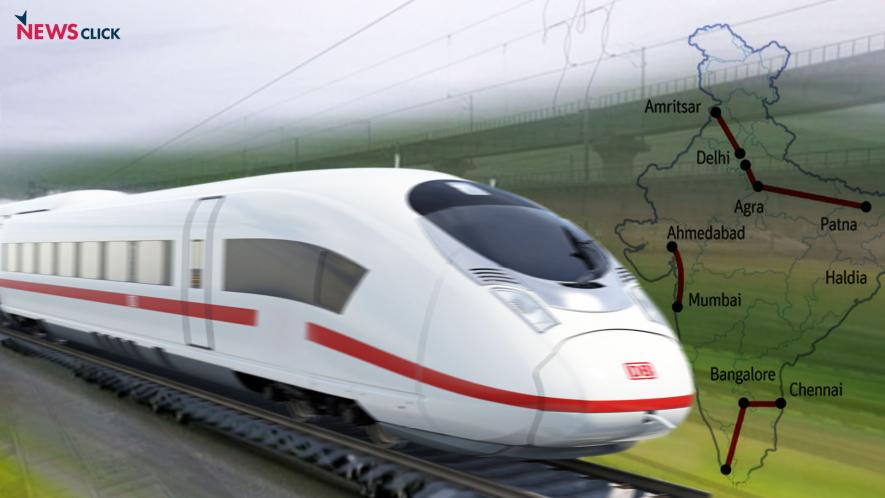Bullet Train: Gujarat Farmers Move HC Opposing Forceful Land Acquisition

As many as 1,000 farmers have moved the Gujarat High Court defending their livelihood and farming land which is scheduled to be acquired for the Mumbai-Ahmedabad Bullet Train project. Negating the claims of the Gujarat government that majority of the farmers in the state are ready to give up their land for the proposed Bullet Train project- Mumbai-Ahmedabad High Speed Rail Corridor (MAHSRC), the farmers have submitted affidavits before the court on Tuesday.
The Gujarat government in its affidavit against the petitions has stated that a “much larger proportion of landowners whose lands are proposed to be acquired have offered their lands by consent.” However, advocate Anand Yagnik, who appears for the farmers in the court, said that the government has furnished incorrect data.
The 508 km bullet train project, a pet project of PM Modi, is proposed to pass through Gujarat, Maharashtra, and Dadra and Nagar Haveli. Of this, about a 382 km-long line passes through the villages in Gujarat crushing more than 700 hectares of farming land in the state.
How the project is effecting land acquisition?
Even though it is a multi-state project, land acquisition processes are unique to each state. In Gujarat, ahead of the commencement of the bullet train project in 2016, the BJP-led state government had amended the Land Acquisition Act of 2013. After diluting the act, Japan had entered into the project with a contract with the Centre in September 2015. The bullet train project which costs Rs. 1.1 lakh crore will be constructed with a loan of Rs. 88,000 crore from Japan.
Also read: India to Spend Three Times More Than China on Bullet Train
“As it is a multi-state project, the Central government should be the appropriate authority to deal with the procedures and we demand uniform procedures as per the Land Acquisition Act of 2013 in all project affected states and union territory,” said Jayesh Patel, president of the Gujarat Khedut Samaj, while speaking with NewsClick. Gujarat Khedut Samaj is one of the organisations which are fighting for the rights of farmers and tribals in the project affected areas in the state.
According to the entitlement matrix, in Maharashtra, a person who loses their land, whether it is agricultural land or non-agricultural land, is entitled for Rehabilitation and Resettlement (R&R) cost/assistance as per the Second Schedule of the Right to Fair Compensation and Transparency in Land Acquisition, Rehabilitation and Resettlement (RFCTLARR) Act 2013 and the “R&R amount/assistance shall be payable according to the Second Schedule of the Act No. 30 of 2013”. While the remark in the entitlement matrix of Gujarat says, “In Gujarat, R&R amount/assistance shall be fifty per cent of the amount of compensation (for land) as determined under the RFCTLARR (Gujarat Amendment) Act, 2016.”
“Simply, the dilution of the Act has brought down the compensation package due to the affected people,” Patel said.
“The provisions of social assessment, food security, rehabilitation and resettlement which were in the chapter 2 and 3 of the 2013 Act have been bypassed by the Gujarat government,” Patel added.
The farmers and tribals from the project affected areas of Gujarat and Maharashtra have been raising their voice to protect their livelihood for a long time. In June this year, Gujarat farmers had held an awareness campaign covering all the 192 affected villages in the state.
Opposing the forceful acquisition of fertile lands for the bullet train project, the farmers had demanded that the land near the western railway track should be used for the particular project. As per the feasibility report for the bullet train project, it requires a land width of 17.5 meters. “Of this, 4 meter is service land. The actual requirement for the bullet train track is 12.5 meters. More than 20 metre land is available on either side of the western railway track. That land should be used instead of the farming land. Apart from this, one dedicated freight corridor track is also being built. They have already acquired the land for this corridor. There is also enough space for the bullet train,” Patel had pointed out how the project can be implemented without destroying the livelihood of the farmers and tribals.
Struggles of the Maharashtra Farmers
While, in Maharashtra, the struggles for the rights of farmers and tribals are being jointly led by the All India Kisan Sabha (AIKS), the Adivasi Ekta Parishad and Shetkari Sangathan. So far, the farmers and tribals in Maharashtra have come out to the streets to defend their rights. On May 3 this year, more than 50,000 farmers had rallied in the Palghar district highlighting the plight of the farming community.
Get the latest reports & analysis with people's perspective on Protests, movements & deep analytical videos, discussions of the current affairs in your Telegram app. Subscribe to NewsClick's Telegram channel & get Real-Time updates on stories, as they get published on our website.
























